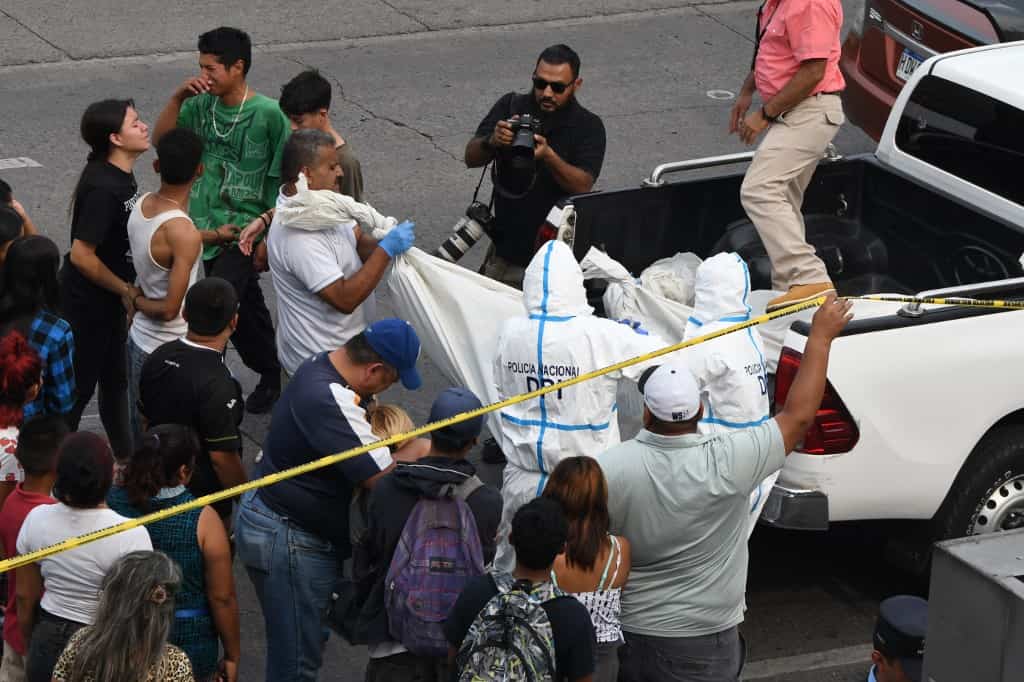Armed with rifles, a dozen police officers enter a hillside slum in the Honduran capital in search of gang members, in an operation similar to the anti-gang raids launched by President Nayib Bukele in El Salvador.
The uniformed men climb up steep concrete steps on the hillside of the Divanna neighborhood, which is more than 500 meters high. They then cross alleys that separate the battered brick and zinc houses.
In front is Sub-Inspector Maria Dominguez, a petite indigenous Lenca officer, clutching an Israeli Galil Sar automatic rifle.
“The Barrio 18 gang operates in this neighborhood. “It is a strategic place where they can mobilize and […] hide from the authorities,” said the officer.
In Honduras, two gangs, the Barrio 18 and the Mara Salvatrucha, have divided the territory. They impose their rules and make money from drug sales, contract killings, extortion and other crimes.
During the police patrol in Divanna, the doors of the houses are closed, the inhabitants are silent inside and barking dogs can be heard. Several houses appear abandoned.
A basketball court stands out on the top of the hill, with graffiti from Barrio 18.
Military deployment
To combat gangs, a state of emergency has been in force in Honduras since December 6, allowing arrests without warrants, similar to the one that has been in effect for the past year in El Salvador.
On March 31, Honduran President Xiomara Castro headed a meeting with military chiefs and the heads of Congress and the Supreme Court, in which they decided to implement a “second stage” of the anti-gang crusade, with the deployment of the military in the streets.
Now, “Army, Air Force and Navy will collaborate in an effective way, executing actions and activities in security matters” together with the police, the government said in a communiqué at the time.
Military deployment on the streets is not new in this country, one of the most violent in the world despite closing 2022 with the lowest homicide rate in 16 years.
The government’s actions were met with a response. Earlier this month, incarcerated gang members clashed in four prisons, resulting in one death and seven injuries.
In response, Castro ordered an intervention that includes “real disarmament” and combating corrupt prison authorities who even let in rifles, grenades, telephones and drugs in exchange for money.
The gang members run organized crime operations on the outside from the prisons, which is why the government also ordered the tapping of communications in the prisons.
However, clashes have been recurring almost daily in different prisons, with some 20 people injured in the incidents.
Bukele has imprisoned more than 67,000 alleged gang members, with raids covering entire municipalities, where police and military have been surrounding them for days or weeks. However, his methods are criticized by the Catholic Church, the UN and human rights organizations.
Four killed in shootout
In Honduras, the anti-gang campaign has not had that scope, with barely more than 500 arrests. But this Wednesday police patrols clashed with members of the Gang 18, resulting in four dead and four arrested in two separate operations in the areas of Amarateca and Soroguara, both about 10 km north and northwest of the capital, according to a statement from the Ministry of Security.
Honduran criminologist Gonzalo Sanchez maintains that the country “lacks the will” to fight crime.
“Compared to the state of emergency in El Salvador […] there has indeed been political will,”said Sanchez.
Disappointment
After four hours of searching the alleys of the Divanna neighborhood, the police leave without arrests.
The police barracks in the neighborhood, located at the foot of the hillside, was attacked on January 30, in the midst of the state of emergency, by alleged gang members, who also shot at a patrol car, killing officer José Luis Zambrano.
The state of emergency was initially decreed for one month, but has been successively extended due to “good results”.
Originally the measure was to apply to neighborhoods in Tegucigalpa and the northern city of San Pedro Sula, but was extended to 123 of the country’s 298 municipalities.
In the Alemán neighborhood of Tegucigalpa, where the government launched the anti-gang campaign, people mock the state of emergency.
“Rather they don’t call it that, they call it a ‘state of deception’, because [the authorities] are not doing anything” and gang extortion of the population “is the order of the day”, said David Velásquez, 65, who lives in this colony.






